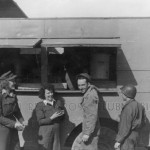Discovered by Scottish bacteriologist Alexander Fleming in 1928, penicillin was found to be effective in treating serious bacterial diseases, from syphilis to staphylococcus infections.
Originally, penicillin was produced on a small scale. Within a decade, the number of wounded soldiers returning from World War II dying from infection mandated the mass production of penicillin.
Although a number of European scientists tackled the challenge, Indiana native and Wabash college graduate Andrew J. Moyer found the key to mass-producing the antibiotic while working as the director of the USDA’s Northern Research Laboratory.
An expert on the nutrition of molds, Moyer found he was able to increase yields tenfold when penicillin mold was cultured in a broth of corn steep liquor and lactose.
The process known as industrial fermentation was the first use of corn steep liquor to grow microorganisms. Moyer also discovered that the production rate could be sped up when the improved medium underwent continuous shaking.
Moyer’s innovation facilitated the mass production of penicillin, saving the lives of an estimated 12 to 15 per cent of Allied soldiers wounded in World War II. Mass production also led to greater supply of penicillin, subsequently lowering its cost from $20 to 55 cents a dose in three years.
He was granted four patents for his work on penicillin, and continued to work for the Northern Research Laboratory until he retired in 1957. He died two years later on February 17, 1959, after a month-long illness.
In 1987, Moyer was posthumously invited into the National Inventors Hall of Fame; the first government researcher to be inducted
Moyer’s method of creating fermentation with corn steep liquor still serves as a model for the development of many other antibiotics.






















